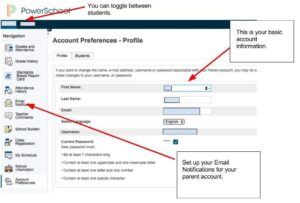Maybe your grades on PowerSchool aren’t quite what you hoped they would be, or perhaps you’re just curious about the process. Whatever the reason, you’ve stumbled upon the intriguing question: How to change grades on PowerSchool? Well, fret not, because this post will delve into the methods, considerations, and ethical implications surrounding altering grades on the widely used educational platform.
One common process students use to change grades on PowerSchool involves exploiting vulnerabilities in the system’s security or manipulating the browser’s inspect element feature. By inspecting the webpage’s code, students can locate the grade element and modify it to display a higher grade. Alternatively, some may attempt to obtain teacher login credentials through phishing or other means to directly access and alter grades.
Such actions not only violate academic integrity but also pose serious legal and ethical consequences. It’s crucial for educational institutions to implement robust security measures and educate both teachers and students about the importance of maintaining academic honesty.
“DO YOU WANT TO CHANGE YOUR GRADE? HIRE A PRO TODAY”
Legal and ethical considerations of grade manipulation

Legal and ethical considerations surrounding grade manipulation in education are paramount, as they directly impact fairness, trust, and integrity within the educational system. Here are some key points to consider:
- Fairness and Equity: Manipulating grades unfairly advantages or disadvantages certain students, violating the principle of equal opportunity. This can lead to legal challenges based on discrimination or inequity.
- Academic Integrity: Grade manipulation undermines the integrity of the educational process by distorting the true assessment of students’ knowledge and abilities. It can erode trust between students, educators, and institutions.
- Misrepresentation: Falsifying grades misrepresents a student’s academic performance, which could have legal implications, particularly if the misrepresented grades are used for college admissions, scholarships, or employment.
- Contractual Obligations: Educational institutions often have contractual obligations to accurately assess and report student performance. Grade manipulation may violate these contractual agreements, leading to legal repercussions.
- Professional Standards: Educators are typically bound by professional standards and codes of ethics that require them to uphold fairness, honesty, and integrity in grading practices. Violating these standards could result in disciplinary actions or legal consequences.
- Data Privacy and Security: Manipulating grades may involve accessing or altering sensitive student data, raising concerns about data privacy and security. Unauthorized access or manipulation of student records could violate laws such as the Family Educational Rights and Privacy Act (FERPA) in the United States.
- Liability: Educational institutions may be held liable for grade manipulation if it results in harm to students, such as impeding their educational opportunities or causing emotional distress.
- Loss of Accreditation: Institutions found to engage in widespread grade manipulation risk losing accreditation or facing other sanctions from accrediting bodies, which can have serious consequences for their reputation and funding.
Grade manipulation raises significant legal and ethical concerns related to fairness, integrity, contractual obligations, data privacy, and institutional liability. Educational stakeholders must uphold high standards of transparency, honesty, and accountability in grading practices to maintain the trust and integrity of the educational system.
How to change grades on powerschool
One common process students use to change grades on PowerSchool involves exploiting vulnerabilities in the system’s security or manipulating the browser’s inspect element feature. By inspecting the webpage’s code, students can locate the grade element and modify it to display a higher grade.
Alternatively, some may attempt to obtain teacher login credentials through phishing or other means to directly access and alter grades. Such actions not only violate academic integrity but also pose serious legal and ethical consequences.
It’s crucial for educational institutions to implement robust security measures and educate both teachers and students about the importance of maintaining academic honesty.
Additionally, schools should regularly update their systems and monitor for any suspicious activity to prevent unauthorized grade changes. Educating students about the consequences of academic dishonesty and promoting a culture of integrity can deter such behavior.
Implementing multi-factor authentication for teacher accounts and limiting access to sensitive information can also help mitigate the risk of unauthorized grade tampering. It’s essential for schools to prioritize the security and integrity of their academic records to maintain trust and fairness within the educational community.
Common vulnerabilities in PowerSchool
PowerSchool, like any other software system, may have vulnerabilities that could potentially be exploited by malicious actors. While specific vulnerabilities can vary over time due to updates and patches, some common vulnerabilities in systems like PowerSchool include:
- Authentication Flaws: Weaknesses in authentication mechanisms could allow attackers to bypass login credentials or gain unauthorized access to sensitive data.
- Session Management Issues: Inadequate session management practices may lead to session hijacking or fixation, allowing attackers to impersonate legitimate users and access confidential information.
- Data Validation and Input Sanitization: Failure to properly validate and sanitize user inputs can result in vulnerabilities such as SQL injection or cross-site scripting (XSS), enabling attackers to execute malicious code or manipulate database queries.
- Insecure Direct Object References (IDOR): Insufficient access controls or direct object references may allow attackers to access unauthorized data or perform unauthorized actions by manipulating URLs or parameters.
- Sensitive Data Exposure: Improper handling of sensitive information, such as student records or financial data, could lead to exposure through insecure transmission, storage, or access controls.
- Cross-Site Request Forgery (CSRF): Lack of CSRF protections may enable attackers to trick authenticated users into unknowingly executing malicious actions on the PowerSchool platform.
- Insecure Configuration: Misconfigurations of the PowerSchool system, web server, or database could create security gaps that attackers could exploit to gain unauthorized access or escalate privileges.
- Inadequate Logging and Monitoring: Insufficient logging and monitoring capabilities may hinder detection of unauthorized access or suspicious activities, allowing attackers to operate undetected for extended periods.
- Outdated Software and Dependencies: Failure to promptly apply security patches or updates to PowerSchool and its dependencies may leave the system vulnerable to known exploits and attacks.
- Third-Party Integrations: Vulnerabilities in third-party plugins or integrations with PowerSchool could introduce additional attack vectors, especially if these components are not regularly updated or maintained.
To mitigate these vulnerabilities, it is crucial for PowerSchool administrators to regularly update the system, apply security patches promptly, implement robust authentication and access controls, conduct regular security assessments, and stay informed about emerging threats and best practices in cybersecurity.
Potential consequences of grade tampering

Grade tampering, whether done by students, educators, or administrators, can have serious consequences for all parties involved and for the integrity of the educational system as a whole. Here are some potential consequences:
- Loss of Trust: Grade tampering erodes trust between students, parents, educators, and educational institutions. It undermines the credibility of academic assessments and can lead to skepticism about the fairness and reliability of grading systems.
- Academic Dishonesty: For students who engage in grade tampering, there is a risk of being accused of academic dishonesty or cheating. This can result in disciplinary actions, such as suspension or expulsion, and tarnish their academic record, affecting future educational and career opportunities.
- Legal Ramifications: Grade tampering may violate laws related to education, data privacy, and fraud. Depending on the severity and intent of the tampering, legal consequences could include fines, lawsuits, or criminal charges.
- Loss of Reputation: Educational institutions implicated in grade tampering scandals can suffer irreparable damage to their reputation. Negative publicity can deter prospective students, damage relationships with stakeholders, and affect funding and accreditation status.
- Professional Consequences: Educators or administrators involved in grade tampering may face disciplinary actions, such as termination of employment, loss of licensure, or damage to their professional reputation. Their actions can also undermine the credibility of the entire profession.
- Educational Inequity: Grade tampering perpetuates educational inequities by unfairly advantaging or disadvantaging certain students. It undermines efforts to promote fairness, diversity, and inclusion in education by distorting assessment outcomes.
- Loss of Funding and Accreditation: Educational institutions found to engage in grade tampering may face financial penalties or lose eligibility for funding and accreditation. This can have long-term repercussions for the institution’s viability and sustainability.
- Diminished Learning Outcomes: Grade tampering undermines the integrity of the educational process by devaluing the importance of genuine learning and academic achievement. It can lead to inflated grades that do not accurately reflect students’ knowledge or skills, hindering their educational growth and development.
Grade tampering can have far-reaching consequences, including loss of trust, legal ramifications, damage to reputation, professional repercussions, perpetuation of inequity, financial penalties, and diminished learning outcomes. It is essential for all stakeholders in education to uphold integrity, honesty, and fairness in grading practices to maintain the credibility and effectiveness of the educational system.
Conclusion
Attempting to change grades on PowerSchool is not only unethical but also carries significant consequences. It undermines the integrity of the education system and devalues genuine academic achievement.
Instead of seeking shortcuts, students should focus on honest effort and seek support when needed. How to change grades on PowerSchool? The answer lies not in manipulation, but in dedication, perseverance, and a commitment to academic integrity.
